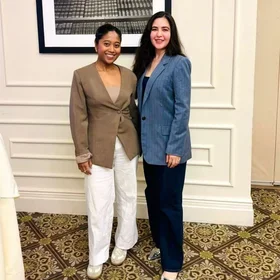Dr. Obiora N. Anekwe first heard about bioethics due to the Tuskegee Syphilis Study, the notorious forty-year clinical study in which medical professionals neglected to treat hundreds of African American men who suffered from syphilis. In a way, bioethics was his birthright: He was born in John A. Andrew Memorial Hospital in 1974 where the study had taken place.
A former counselor, administrator, and teacher at Tuskegee University, Anekwe had a lifelong curiosity about the ethics of the syphilis study and a desire to bring healing to communities such as Tuskegee. Anekwe says, “I want to be able to help vulnerable populations, people who, a lot of times, are voiceless and can’t necessarily speak for themselves.”
He began his training in bioethics by attending a Georgetown University summer certificate program. He was inspired by his professors including Dr. Edmund Pellegrino, founding director of the Center for Clinical Bioethics at Georgetown and one of the preeminent scholars in bioethics. “I was encouraged by that to get my Master’s in bioethics,” Anekwe says.
But at that point, his family went through a transition. “My great-aunt had just passed away. My family asked me if I was willing to move to Brooklyn and supervise my great-aunt’s brownstone. I decided to move to Brooklyn and also apply for the bioethics program at Columbia.”
Once in New York, Anekwe jumped into his studies. He took the core courses including the Philosophy of Bioethics and the History of Bioethics but also tailored the program to his interests. “My focus was race and justice. I took courses in health and race, I took a course at the School of Public Health with Dr. Robert Fullilove.”
Anekwe was also part of the first cohort of graduate students in bioethics who interned at one of Columbia’s institutional review boards, ethics committees that oversee clinical studies that involve human subject research. Through his work at the New York State Psychiatric Institute IRB, Anekwe got a firsthand glimpse of ethics in action. He says of working with administrative director Dr. Ilene Wilets, “It gave me an understanding of what my role in the future could be.”
But Anekwe’s work transcended the program’s classes and internships. Last year, he co-wrote with his brother Dr. Ejinkonye C. Anekwe the book Chronicling the Tuskegee Syphilis Study: Essays, Research Writings, Commentaries, and Other Documented Works, published in December 2013. His upcoming book will present 30 of Anekwe’s collages, including one that graced the cover of the journal Academic Medicine. He says, “I wanted to use my artistic ability to translate the themes of the Tuskegee Syphilis Study and, in general, discuss ethics, philosophy, and bioethics in a way that everyone would understand.”
In May, Anekwe graduated with an M.S. in Bioethics. He was the program’s Class Marshal and was highlighted in Dean Kristine Billmyer’s commencement speech. He’s a proud Columbian like his great-aunt, great-uncle, and great-cousin, and he hopes ultimately to become a professor.
What’s next for Anekwe? This fall, he will become a New York City teaching fellow. He will bring his talents to District 75, the Special Education District within the New York City Department of Education, which serves a wide range of special needs children.
Anekwe says, “I’ve been given so much education that...I want to transcend my learning and help people who need assistance – and need it desperately.”


